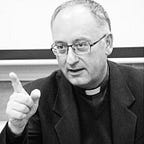Believers are Citizens
The current crisis in democracy
What place does Christian discipleship have in the modern democratic society? How can Christians contribute to a healthy democracy and a government truly of the people?
On the occasion of the 5thConvention of the Italian Church, which took place in Florence in 2015, Pope Francis gave a talk saying words that place a bond between faith and politics, because “believers are citizens”.
“The nation is not a museum — Francis stated — but a collective work under permanent construction in which the very things that differentiate, including political or religious memberships, are to be placed in common.”
But, above all, he added that it is useless to seek solutions in “obsolete practices and forms that even culturally lack the capacity to be meaningful.”
And here we are at the current crisis in democracy.
In a time in which the need for participation is expressing itself in new forms and ways, it is no longer possible to return to rhetoric already heard.
The propulsive force of democratic Catholicism needs to be resistant in these confused times, but also to listen and to understand better, even those today who have managed to intercept the people’s moods and ideas. Augustine and Benedict, before the collapse of the Empire, laid the foundations of Christianity in the Middle Ages. Christianity has never been afraid of paradigm shifts.
It is impossible to think about the future of a Nation without the active participation of all citizens.
Here’s the point: only an effective exercise of synodality within the Church will be able to help us to read our history today and to discern. What is synodality? It consists in the involvement and active participation of all the People of God in the life and mission of the Church through discussion and discernment. It rejects every form of clericalism, including that which is political. The crisis of the historical function of the élites — who until recently had succeeded in giving Western democracies the best of themselves — must open our eyes. Synodality is rooted in the nature of the Church as “of the people”, the people of God.
Why synodality?
Why the broad involvement? Because, first of all, we have to understand what happened to us. We imagined that the Gospel had soaked into our people, but now we notice that the message of Christ remains, at least sometimes, still a scandal. Feelings of fear, suspicion, and even hate — completely alien to Christian consciences — have taken shape among our people and have been expressed on the social networks, as well as in personal broadcasting of this or that political leader, ending up polluting the aesthetic and ethical sense of our people.
To this is added the fact that today political power has “theological” ambitions.
The Bible as well is used as a sign of political value, but in the opposite manner to which we are used to: if before you gave to God that which instead would have been good it remained in Caesar’s hands, now it is Caesar to seize and brandish what is God’s, sometimes even with the complicity of the clerics.
The enemy, then, is no longer only secularization, as we have often said, but it is fear, hostility, feeling threatened, the fracture of social bonds and the loss of the sense of human fraternity and solidarity. In society, confidence is failing: in doctors, in teachers, in politicians, in journalists, in clergy…
Francis recommends the rebuilding of bonds to favor “social friendships”.
Then, the task of the Church — he said — is “to give a clear response to the threats that emerge from public debate: this is one of the forms of specific contribution of believers to the building of a common society”.
It is to flee, then, from the tomb option, that is, the heresy that our communities no longer have anything to say in our society.
What, then, should the sense of this answer be? We can recognize it in the importance of the commitment to recognize ourselves as a community of life that has a common destiny. Feeling ourselves as a community means sharing values, perspectives, rights, duties, thinking of ourselves within a common future, of building together.
On the other hand, the strength of the Catholic Church in politics is her catholicity, that is, her capacity of recalling universality and holding together the pieces there where everything seems to be going to smithereens.
At this point, let’s return to our original question. We can recognize our task as disciples of Christ engaged in the tensions of our modern democracy in two points: on the one side, opposing the tendencies towards the regression of history; on the other, doing our part to build the country as a community of life, taking care of the wounds of the broken bonds and of the betrayed trust. And this will be able to happen only thanks to a broad involvement of the people of God, in a process not restricted either to the elites of Catholic thought nor to the — specific and important — contexts of formation.
The exercise of synodality and that of democracy are different things as to method. But you can easily grasp how important synodality is in the Church to discern the democratic forms of engagement of Christians so that they are builders of a Nation.
